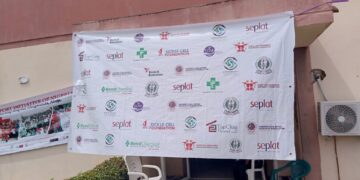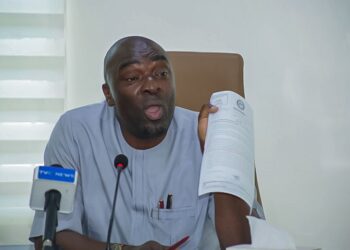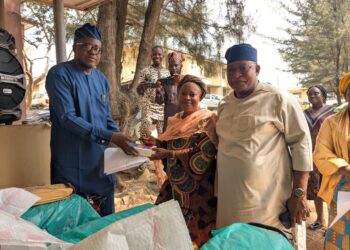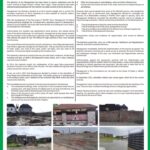

The Federal Government through the Ministry of Agriculture and Food Security on Saturday 25th November, 2023 flagged off the cultivation of dry-season staple crops for the country in Jigawa State as a milestone in realizing food security in the Renewed Hope agenda of His Excellency, President Bola Ahmed Tinubu. The move is part of measures to combat food inflation in the country and a direct response to President Bola Tinubu’s declaration of emergency on food security in July 2023. The Flag-Off ceremony of National Agricultural Growth Scheme and Agropocket (NAGS-AP) which had in attendance important interested parties from different sectors was held in Hadejia, Jigawa. Representing the President at the event were the Minister of Agriculture and Food Security, Senator Abubakar Kyari, Minister of State of Agriculture and Food Security, Senator(Dr.) Aliyu Sabi Abubakar, Special Assistant to the President on Agriculture and Food Security, Hon. Abiodun Mufutau Yinusa.
The Minister of Agriculture and Food Security, Senator Abubakar Kyari while speaking during the Flag-Off ceremony said the Federal Government of Nigeria secured a $134 million loan facility from the African Development Bank (AfDB) for the project and the dry season farming offers Nigeria a unique opportunity to harness the untapped potential in the diversification of Nigeria’s food production capabilities with the aim of increasing crop yield by at least 20% compared to the previous year.
“The dry season farming is an integral part of the National Agricultural Growth Scheme and AgroPocket (NAGS-AP) Project, made possible by a $134m loan facility advanced to Nigeria by the African Development Bank(AfDB) and encapsulates this Administration’s resolve to expand the capacity of our farmers to engage in the cultivation of key staples like rice, maize, cassava and wheat, across the country. These high value staples will be joined by others like soybeans and sorghum in the wet season”, the Minister said.
The Minister said the project plan to support between 150,000 to 250,000 wheat farmers with 50% input subsidy to cultivate between 200,000 to 250,000 hectares and an expected yield of 1,250,000 tonnes of wheat. Other selected staples are earmarked for similar, varied support, all aimed at significantly reducing food inflation, as well as Nigeria’s dependence on foreign imports, while increasing domestic consumption. Ultimately, this will promote agricultural self-sufficiency and stimulate economic growth. To achieve our goals, government is committed to ensuring that the support does get to the farmer. Accordingly, the Program will be Technology enabled, thus guaranteeing transparency and accountability in the provision of the subsidy and other support services like extension, insurance and additional finance.
“Equally, our farmers are guaranteed access to improved seeds – in this particular instance, I would like to point out that we are deploying heat tolerant wheat varieties like Borlaug 100; Attila etc. Furthermore, we will progressively invest in irrigation infrastructure projects to optimize water usage and mitigate the challenges posed by the dry season” the Minister added.
The Governor of Jigawa State, Mallam Umar Namadi in his remarks said Wheat Development Program is an integral part of the Renewed Hope Agenda of President Bola Ahmed Tinubu aimed at accelerating the Nation’s drive to achieve food security. The Wheat Development Program partnership with the Federal Government is in line with our resolve to sustain progress and built on previous achievements of the agricultural transformation agenda. He said the full package comprises of appropriate mix of fertilizer, in-organic liquid urea, organic fertilizer fortified with booster/growth enhancer, certified wheat seeds, and herbicides. It is expected that the capacity of over 42,000 smallholder farmers will be significantly expanded through their participation in the Program. Each of these would be provided with input subsidy support granted by the Federal Government equivalent to 50% of the estimated cost of packaged input requirements amounting to about N361,000 per hectare.
“While each farmer is expected to pay only 12.5% of the total cost of input package equivalent to about N42,125 per hectare at the point of input collection, the balance of N135,275 would be recovered after harvest. In order to provide comfort to the Federal Government and input Suppliers, the Jigawa State Government has worked out an arrangement with Nigeria Incentive-Based Risk Sharing System for Agricultural Lending (NIRSAL) to provide guarantee for the balance of 37.5% of the cost of inputs supplied. The Jigawa State Government will provide free high-quality extension service to the wheat farmers for which arrangements have been concluded for the engagement and training of additional 1,440 extension agents to ensure full coverage,” he added.















